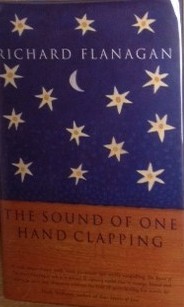Inspiring Older Readers
 posted on 04 Aug 2015
posted on 04 Aug 2015
The Sound of One Hand Clapping by Richard Flanagan
This is a big-hearted novel, packed full of good intentions. Having said that, it’s also got plenty of problems and I want to get my gripes out of the way before I move into positive mode. For a start – it’s way too long; in my view at least twice as long as it needed to be. Apart from the lack of a strong editor this is a problem because Flanagan seems to equate good writing with obsessively detailed description and impossibly over-wrought emotion. The pages are positively heady with the smell of pulsating and suppressed emotion and the landscape responds accordingly. If words could stick to you, these would. In the opening 50 pages or so I was convinced I might end up the victim of death by simile – why describe something in a clear, straightforward way when you can build a giant, embroidered simile? And the plot? Well, I wouldn’t have been surprised to find it was an adapted soap opera script, full of unexplained motives, surprise (and effectively unexplained) pregnancy and an apocalyptic disaster that brings about reconciliation. And why, oh why, is it called 'The Sound of One Hand Clapping'?
So far so bad. But this was a hugely popular novel and was award winning in its native Australia, so it must have merits. And its strengths are all about its humanity. This is a story of European migrants, “wogs”, who end up doing the dreadful, heavy labouring jobs in Tasmania where the weather is unkind and extreme. These migrants who have come from war-torn Europe are seeking a new life as Australians but are doomed forever to be outsiders.
Sonia is born to Maria and Bojan Buloh and we are shown her life as a child and her attempts to reconcile that life as a middle-aged woman returning to Tasmania after having ‘escaped’. The story is told in a series of relatively short chapters alternating between the late 1950s and the late 1980s and it’s a gut-wrenching journey. She loses her mother - who simply walks out to her death in a snow storm at the start of the novel – and has to live with a drunken, feckless but ultimately loving father and a series of carers and childminders.
I’m not even going to attempt a summary of the plot because if you’re going to read the book almost anything I would say would be a sort of plot spoiler. And I would recommend that you read it despite all the drawbacks I started this review with because Flanagan is clearly trying to do something big and meaningful. There are too few novels that try to understand the lives and motivations of refugees and the displaced. More importantly, few novels that try and understand how damaged so many of them are and how the misery of their lives passes from generation to generation unless that process is stopped by brave action and a willingness to confront painful life stories.
Flanagan should be praised for his willingness to take on a subject that is packed with problems and for turning that into something thousands of people have been keen to read. Pick up a copy when you’re feeling strong and be prepared for a visceral ride.
Terry Potter
August 2015